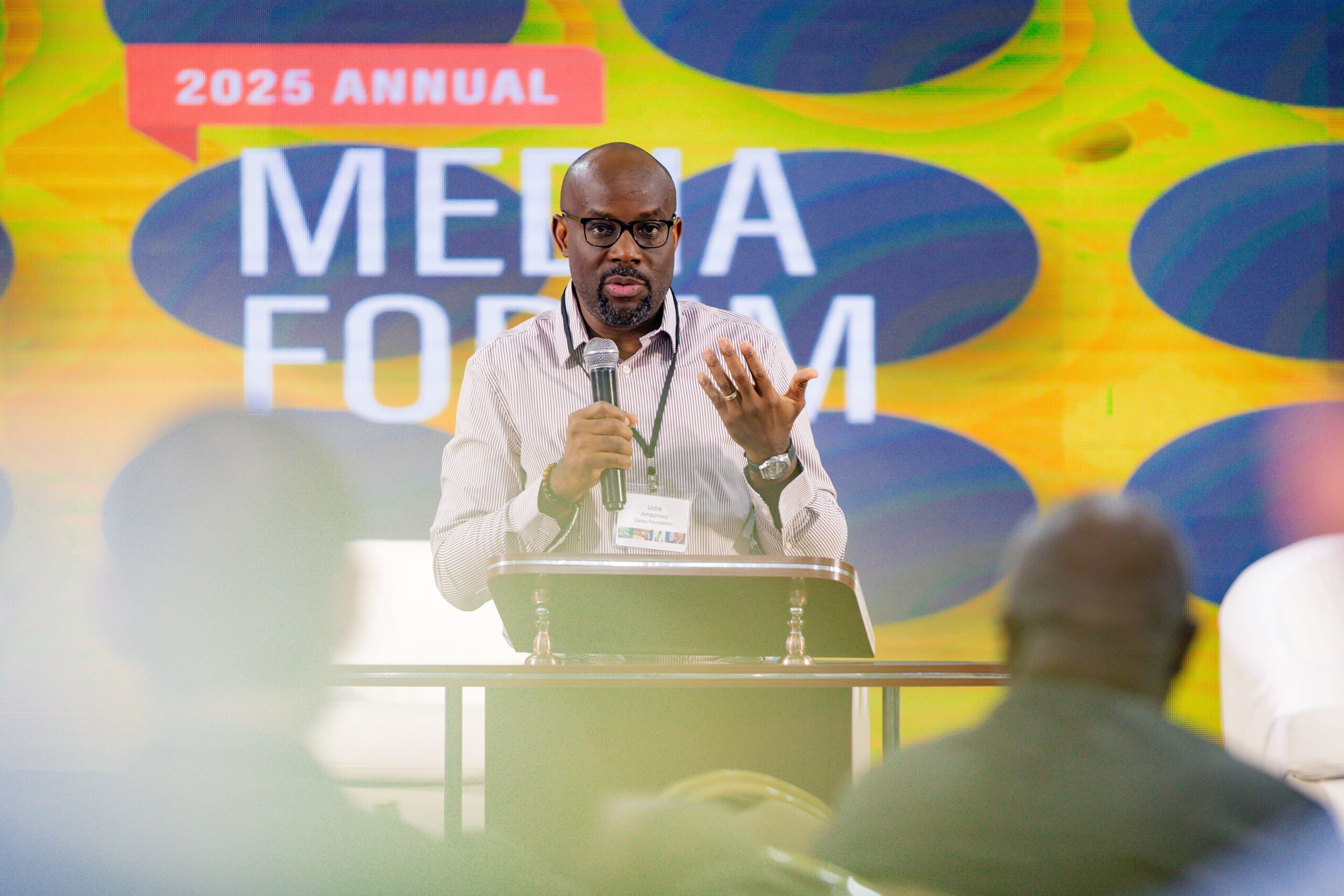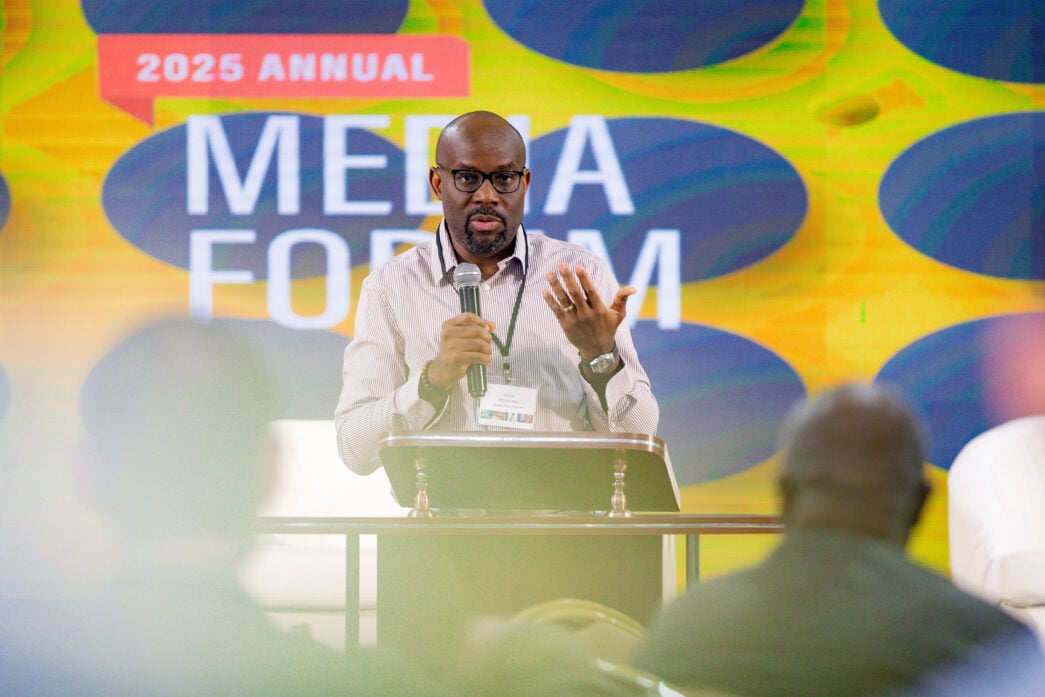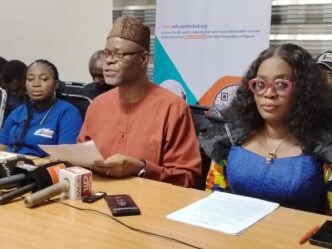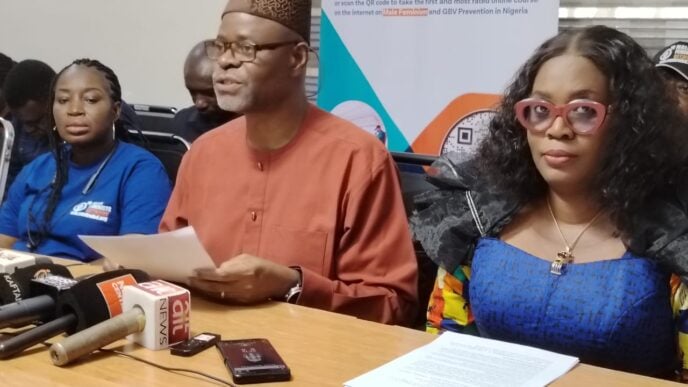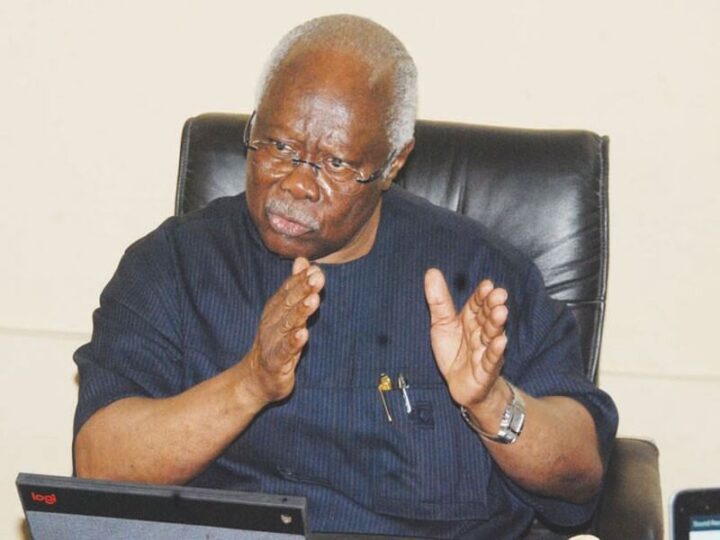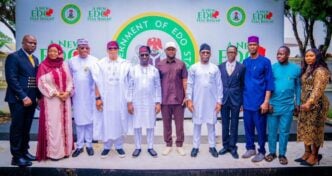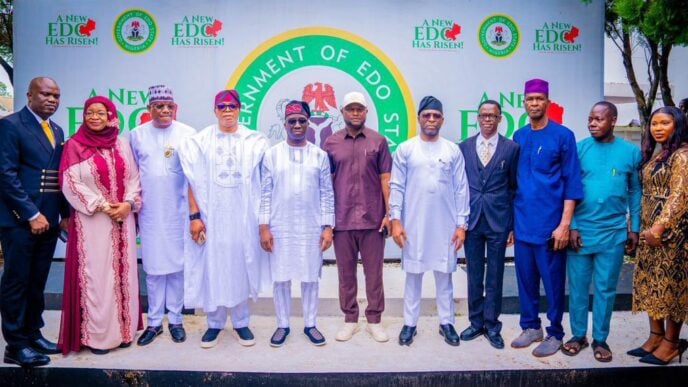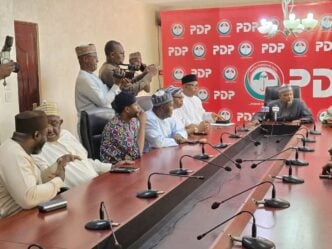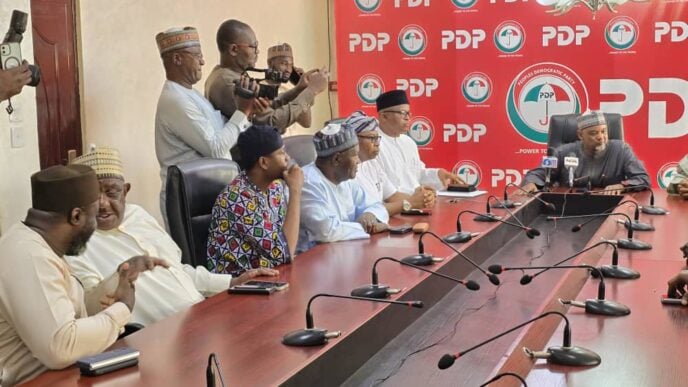Uche AMAONWU, Gates Foundation Country Director Nigeria
On the sidelines of the United Nations General Assembly and the Gates Foundation’s Goalkeepers event in New York, TheCable’s MAYOWA TIJANI sat down with UCHE AMAONWU, the Foundation’s Nigeria country director, for a wide-ranging conversation on malaria, Nigeria’s child-survival crisis, and the financing gaps threatening global health progress—plus the legacy he hopes to leave as a Nigerian leading the Foundation’s work at home.
The Institute for Health Metrics and Evaluation estimates that by 2045, the world could eradicate some of the deadliest childhood diseases, saving millions of lives. For that to happen, Amaonwu explains that a country like Nigeria, with some of the biggest global burden of disease, has to build a politically-immune structure for sustainable health financing.
With five million children under the age of five dying from preventable causes globally, Amaonwu breaks down how sustainable health financing, digital public infrastructure, and genuine political will could bend the curve in Nigeria — and how the next five years can lay the foundation for the nation’s health and wealth.
TheCable: Current data shows that reducing malaria deaths and cases can significantly boost economic growth. However, the impact isn’t immediate. So, governments may lack the incentive to tackle malaria aggressively because the economic benefits often become visible 20 years down the line — long after the next election. So, how do you make the case that these interventions matter, even when they won’t yield short-term political gains?
Advertisement
UCHE AMAONWU: That’s a good question. The goal should be ‘how do you make health politically salient and ensure that improved health outcomes translate into political gains and citizen confidence.,’ especially in a country like Nigeria where it traditionally hasn’t been. In that sense, the recent funding cuts can actually serve as a blessing in disguise.
Just recently, the Director General National Health Insurance Authority (NHIA) called for a four-day dialogue on health financing. The meeting brought together a diverse group from the local governments, who just got financial autonomy through a Supreme Court judgment; to states, ; to the federal government, and development partners. There was a forward looking discussion on how we can do things better, how can we take this sovereignty call as a call to action? How can we make health financing a priority?
I’m focusing on health financing because you need financing to be able to do the interventions in malaria, polio, HIV/AIDs, maternal health and other health systems interventions and things like that. With donors tightening budgets, there’s greater scrutiny and a growing expectation that countries invest their fair share. Encouragingly, I heard candid discussions among state and local leaders acknowledging that they need to do more. That kind of self-reflection is a good place to start.I was encouraged to see that conversation happening. I saw state governments say it’s clear that ‘we are not doing our share, and we need to do more.’ I saw local governments saying, ‘now we’ve got this financial autonomy, we’re going to use it to be able to hold states accountable to make sure they’re delivering on the right things.’ And once that starts happening, then the question is how do you sustain that momentum?
Advertisement
The most hopeful event was an unexpected commitment to health insurance, and you saw that the President recently mandated health insurance. In my interactions with public officials, I maintained that the government is still not spending enough on health. While government and donor spending make up about 30% of total health expenditure, citizens still shoulder around 70% directly, a reminder of why collective action is so important to strengthen health financing. And I think implementing health insurance is one that could reach people’s pocket.
The head of the Senate committee on health, Senator Ipalibo Banigo, was excited about this and noted it is something that she could advocate for. She said, ‘I can use my own constituency allowance to pay for [health insurance] premiums for people in my constituency.’
Think about that for a second, if she does that, can other people do it? Can it be a campaign issue where you’re paying for people to have access [to healthcare] so they don’t go broke and they don’t sell their land and everything they own just because a health emergency happened to their child?
The scarcity of funds has forced the system to start thinking differently and that gives me hope. It is a structural thing; for a long time, we have not done the hard structural work. And this is why we are where we are. If you listen to Ethiopia and Rwanda, they have built systems from the ground for years and now they are reaping the benefits of it. Nigeria has to get there.
Advertisement
For me, even though the Foundation has an accelerated 20-year timeline, in the next five years, we will support any arm of government that wants to do the right thing, with the right planning, budgeting, and the right structural changes to make sure those things are aligned.
Question: Digital Public infrastructure (DPI) has been evolving, and we know that having a strong identity system and proper infrastructure is important. Are the programs you’re implementing designed to support and strengthen this digital public infrastructure?
UCHE AMAONWU: DPI for us are three things: ID, payment infrastructure and data exchange. Nigeria does have an ID system, there has always been multiple, but the National Identification Number (NIN) system has enrolled more than 100 million people, a remarkable milestone. The next challenge is to ensure this infrastructure is fully integrated so citizens can access multiple services without repetitive data capture.
On payment, Nigeria deserves credit. The interbank payment settlement here is robust, stronger than in many advanced economies and it is largely home-grown. The rise of digital payment companies such as MoniePoint has expanded inclusion and demonstrated the power of private sector innovation. The question now is how to build on that momentum, ensuring these platforms provide broader access to financial services.
Advertisement
In our discussions with government, we suggested it is easier to bring all mobile telephone companies together and get them to scale ID enrolment because they are already in the communities selling their services. For each ID they enroll, give them N500, you will scale from 100 million to 170 million quickly. The idea is to be more creative -and it’s not a competition because you’re trying to create a database.
For the payments sector, how do we leverage this 80% that we reached in Findex (Financial inclusion data), and start using that to provide savings and credits to people. Can we for example, start thinking about creating credit profiles for people?
Advertisement
There are a lot of activities happening, but we need to always look across the whole stack. And that is one of the things we are discussing with Kaduna state which is one of the states that has actually gone very far in financial inclusion because the governor declared it as one of his first executive orders when he came and he’s done it. So, now Kaduna state is in a position to actually demonstrate how it can leverage its high rates of digital financial inclusion to improve payment across board — these are the areas we just need to be intentional. Leadership is important, there needs to be somebody demanding it in government.
I will end with one thing which continues to resonate that we did in 2019 in collaboration with the Aliko Dangote Foundation. We collaborated with the Nigeria governors’ forum and convened about eight governors to to deliberate on how to strengthen primary health care (PHC) and they had some great homegrown solutions . Since then, the governors have kept to the commitment and instituted the PHC ] challenge, where we encouraged and support governors to do more around PHC.
Advertisement
I was very inspired by the governor of Gombe, since then, he has done commendable work and now Gombe is one of the exemplars and if you look at the numbers from the Demographic and Health Surveys (DHS) you will see how they’ve improved. That has had long lasting impact. So, don’t underestimate the power of just motivating people — if you have leaders who are willing to take that inspiration and run, magic can happen.
Question: Does the Gates Foundation match government funds with its own funding? Do you do counterpart funding?
Advertisement
UCHE AMAONWU: No, we don’t have to do that because that’s the old development approach. Our focus as the Gates Foundation is on catalytic funding, helping governments pilot solutions and giving them time to assume full ownership.
The Gates Foundation doesn’t focus on counterpart funding because the problem with that model is sustainability. For example, if you say, “We’ll each pay 50% of health worker salaries,” the moment the donor funding stops, the program collapses. The government must see these programs as their own.
What we can do is help them get started and give them time to adjust. For instance, if a state identifies the need to hire 500 midwives today, the government will say we have to put it in next year’s budget. We say okay, hire them now, put them on the books. We’ll give you one year to adjust your priorities. Then we can say, ‘okay, we’ll pay for the first year.’ But after that, you pay 100% for the rest. It’s not counterpart funding; it is buying time for them — it’s catalytic funding.
TheCable: One of the advantages of having a large population in a country like Nigeria is that we can also be among the biggest beneficiaries of reductions in maternal and malaria deaths. Looking at the progress over the years, recent challenges from 2020 to 2025, coupled with this year’s theme of “not stopping at almost,” how would you define Nigeria’s ‘almost’?
UCHE AMAONWU: Nigeria has always been the country of potential. We’ve always had potential since independence. The challenge now is turning potential into sustained progress. We are very good at developing ambitious plans, the task now is turning it into sustained progress.
Real change comes from consistent implementation: having clear metrics, tracking them, and holding ourselves accountable. When those elements align, and when partners keep encouraging performance, potential finally translates into results.
That’s the essence of our “almost.” We are close, but closing that final gap requires discipline, long-term planning, and execution.
TheCable: Right now, we have a minister of health who understands and aligns with the vision. But with elections and politics, things change. Does the Gates Foundation have a plan for such potential changes?
UCHE AMAONWU: Political transitions are inevitable, so our approach is to work with governments to ensure they embed reforms within institutions and not around individuals.
We have also encouraged the government to consolidate resources under a single planning and monitoring framework. Having one transparent annual operating plan makes it easier for everyone, national agencies, donors, and states, to see where funds are going and what results they achieve.
At the state level, continuity tends to be stronger because governors often serve two terms. In states where leadership and planning have been sustained over time, we have seen real improvements in health outcomes. This shows that consistency pays off.
Ultimately, development partners, including the Foundation, must adapt as well. We are focusing our next five-year strategy on strengthening structures that can withstand political cycles, so that reforms outlast any one administration.
Question: How do you get the buy-in of governors and drive them to have the political will to get changes in healthcare done?
UCHE AMAONWU: There are two ways to approach that. One is friendly competition. You’ve listened here today, people keep citing Rwanda, Ethiopia — where are those exemplars in Nigeria?
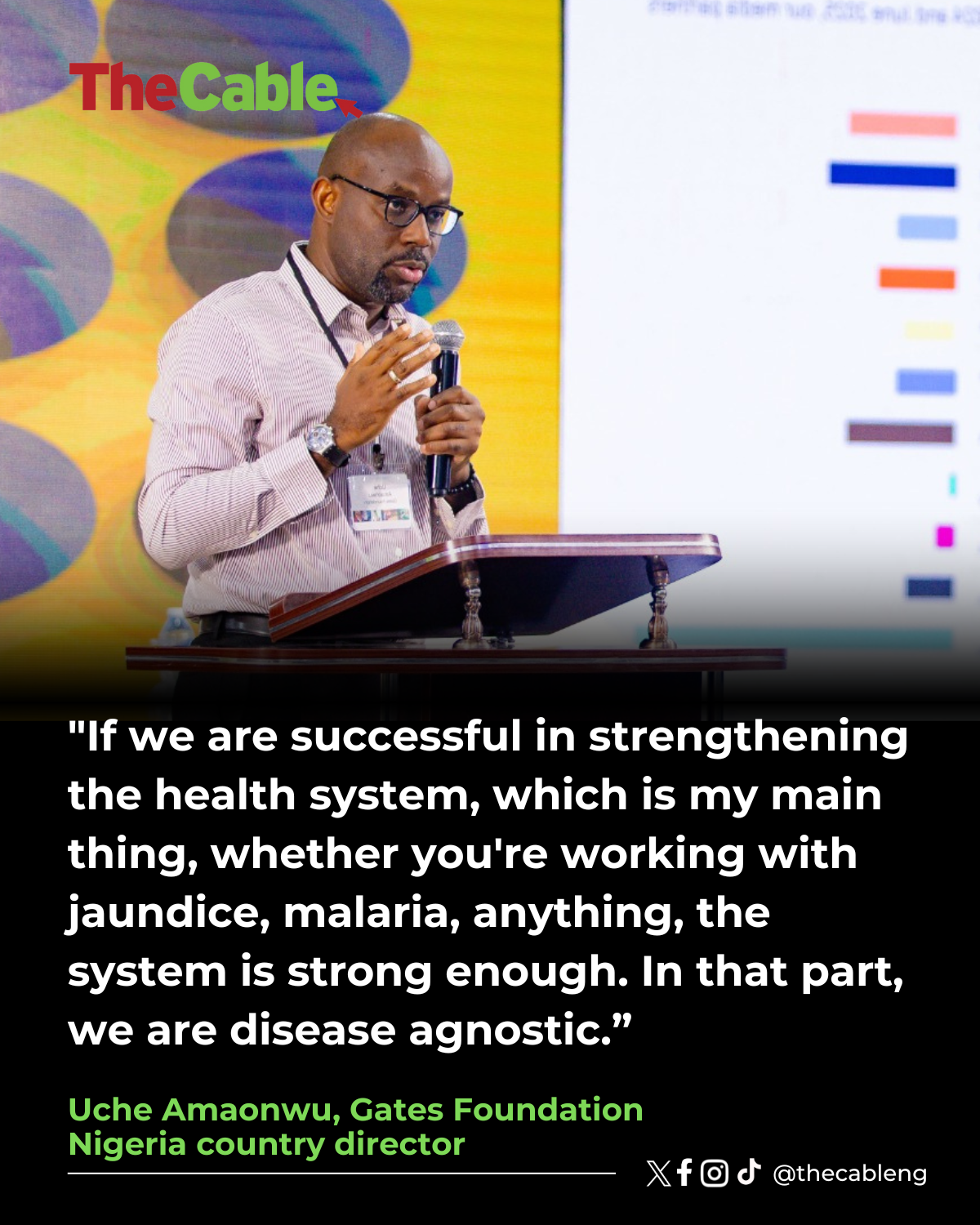
The other is to go where the numbers tell you the women and children are dying the most and say, ‘by fire, by force, we’re going to fix this.’ This has been done in places like Kano and Sokoto. But over time, the metrics haven’t changed as much as people will like to see. There are other states who don’t get a lot of donors, but they are doing the hard work. Can we find those ones and give them a little boost so they can be positive exemplars for other states to emulate?
Nigeria is a unique country; you have to understand people’s motivations and design interventions around them. For us at the Gates Foundation, we are a strategy-driven organization guided by the priorities of our leadership, and the reality is that we don’t do everything. We have a very specific focus on ending preventable deaths of mothers and babies, protecting the next generation from deadly infectious diseases, and lifting people out of poverty and we follow the numbers.
So, for example, something like jaundice, while serious, represents a very tiny percentage compared to malaria, which accounts for roughly 30% of child deaths. But broadly though, if we are successful in strengthening health system, which is my main thing, whether you’re working with jaundice or anything else, the system is strong enough. In that part, we are disease agnostic. Whether it’s jaundice, malaria, or anything else, a strong system with well-trained midwives, capable physicians, and fully stocked facilities can handle it. We believe that at least 80% of these conditions can be effectively managed at the primary healthcare level.
TheCable: For every country director that comes into the foundation, there’s the goal that at the end of my time, this is what I did. If you’re looking at your time in that sort of sense, what would you say as ‘yes, I’m glad that within this period of time I did this’?
UCHE AMAONWU: I’d say three things.
First is figuring out how to sustainably introduce one or two health innovations in Nigeria. At the Gates Foundation, we fund a lot of R&D for interventions that save lives; you saw some of them at Goalkeepers. But developing them is one thing; getting them introduced and scaled in a country as complex as Nigeria is harder.
But I feel if we are able to do it with one or two innovations, we would show the pathway to adoption for other innovation to follow. We need to answer the question of how you do the implementation research to make sure it’s contextualized? What were the things that you needed to scale that innovation? Is it midwives? Is it service delivery guidelines? Is it making sure the supplies are manufactured locally? Is it making sure NAFDAC clears it? I’d like to be able to figure that out because once you figure that out, then you can rinse and repeat. The next innovation that comes in is easy to plug in.
The second thing I love to do is to see how far we can bend the curve on malaria, particularly for Nigeria. Malaria is a big burden for us. We are the number one in the world in terms of the burden. So, I want to see how we can make real progress around being able to get that done.
The third one, which is probably the most important, is that I’d like to help Nigeria get on a path where the economy is growing. If I look at countries like India and China, their growth wasn’t driven solely by individual health interventions. A key factor is that they grew their economies, and they had enough money that they were able to adopt any health innovation, and it wasn’t a problem to fund it.
Today, Nigeria is using about 54% of its revenues to service debt. How much do you have left to do anything? So, I think, if you can solve that revenue side it will help Nigeria. This is what India did; it was an agriculture-based economy, and they were able to increase crop and livestock productivity at the farm level, and the farmer was then able to sell the additional produce and earn a little bit more money. He then used the extra money to buy a mill in his village. He hired people to run the mill, next thing there is a thriving community.
People have done it and there’s a clear stack of policies for how you grow, and we talk about it a lot, but you don’t see the doing. We often say, ‘Oh, we need to diversify from oil… but the next day everybody is still focused on oil’. So, it’s an area I opened up when I came in because we haven’t done a lot of that in space but I’m really going aggressive on that. If that is done, that’s the single most important thing that can solve all those other things I’m talking about.
Editor’s note: This interview has been edited for clarity, length, and style.

